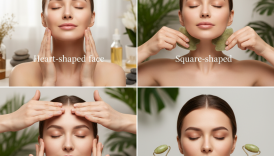ACNE SCARS

How to Treat Acne Scars and Skin Discoloration: Dermatological and Home-Based Solutions
Acne scars and post-inflammatory hyperpigmentation are among the most common skin concerns faced by people of all ages. While acne itself can be frustrating, the marks it leaves behind often have a longer-lasting emotional impact. These scars occur when the skin’s natural healing process is disrupted during inflammation, resulting in dark spots, uneven tone, or even deeper textural indentations. Fortunately, there are both dermatological treatments and effective home remedies that can help fade acne scars and restore smooth, radiant skin.
Understanding Acne Scars and Why They Occur
When a pimple forms, the skin produces excess sebum and dead cells that clog the pores. This blockage allows bacteria to thrive, causing inflammation and redness. Once the inflammation subsides, the skin may overproduce or underproduce melanin — leading to hyperpigmentation or post-acne marks. In more severe cases, tissue loss occurs, resulting in atrophic scars (such as ice-pick or boxcar scars).
Factors such as hormonal imbalance, genetic predisposition, improper skincare, or picking at acne lesions can worsen scarring. To effectively reduce these marks, it’s crucial to support the skin’s barrier function, stimulate collagen production, and prevent further inflammation.
Dermatological Treatments for Acne Scars
For those seeking faster and more targeted results, dermatological treatments offer professional-grade options that can significantly improve skin tone and texture.
1. Laser Treatments
Laser therapy is one of the most effective clinical methods for minimizing both pigmentation and textural irregularities. It works by stimulating collagen production and resurfacing damaged skin layers, revealing smoother and more even skin beneath.
2. Chemical Peels
Chemical peels use controlled exfoliation to remove the top layer of the skin. Formulations containing AHA (alpha hydroxy acids) or BHA (beta hydroxy acids) promote cellular turnover and fade dark spots. These treatments are ideal for those with mild to moderate scarring and dull skin tone.
3. Microneedling
Microneedling involves using fine needles to create micro-injuries in the skin, which trigger collagen and elastin production. This helps to repair scar tissue and improve overall skin elasticity and firmness.
4. PRP (Platelet-Rich Plasma) Therapy
Also known as the “vampire facial,” PRP treatment utilizes the patient’s own plasma — rich in growth factors — to accelerate tissue regeneration and skin healing. This treatment supports new collagen formation and is particularly effective for indented scars.
5. Dermal Fillers
For deeper acne scars, hyaluronic acid-based dermal fillers can be injected to lift depressed areas and provide instant smoothness. This solution offers immediate results and can last several months depending on the filler type.
At-Home Remedies for Acne Scars
While dermatological procedures deliver visible results, not everyone has access to professional treatments. Thankfully, consistent at-home care can also improve acne scars over time — especially when using the right ingredients.
1. Retinoids
Topical retinoids help increase cell turnover, fade discoloration, and smooth out uneven texture. They are among the most researched and dermatologist-approved ingredients for scar management. However, retinoids can cause dryness and sensitivity, so introducing them gradually is key.
2. Vitamin C Serum
Vitamin C is a powerful antioxidant that brightens the skin and reduces hyperpigmentation. Regular use of a vitamin C serum helps neutralize free radicals, protect collagen, and even out the skin tone.
3. Niacinamide
Known as Vitamin B3, niacinamide strengthens the skin barrier, reduces inflammation, and fades dark spots. It is gentle enough for sensitive skin and pairs well with other active ingredients.
4. AHA & BHA Products
Incorporating products containing glycolic acid (AHA) or salicylic acid (BHA) can refine skin texture and unclog pores. These acids promote smoother skin by exfoliating dead cells and accelerating the fading of post-acne marks.
Natural Ingredients That Help Fade Acne Scars
Nature offers a variety of soothing and healing ingredients that can support scar recovery without harsh side effects.
Honey
Honey has antimicrobial and anti-inflammatory properties that help reduce redness and promote healing. Applying a thin layer of raw honey as a mask a few times a week can help calm irritated skin and restore natural glow.
Turmeric
Rich in curcumin, turmeric has been used for centuries for its antioxidant and skin-brightening effects. Mixing turmeric powder with honey or yogurt creates a nourishing mask that helps balance the skin tone and reduce inflammation.
Aloe Vera
Aloe vera gel is another gentle yet effective home remedy that soothes irritation and supports wound healing. Regular use can help fade mild acne marks and restore moisture balance.
Green Tea Extract
Green tea is packed with antioxidants that protect the skin from oxidative stress and prevent dark spots. Using skincare products with green tea extract or applying cooled green tea bags can offer a mild brightening effect.
Daily Skincare Routine Tips
Consistency is key when treating acne scars. A proper skincare routine ensures that your efforts yield long-term results.
-
Gentle Cleansing: Avoid harsh soaps that disrupt the skin’s natural pH. Use mild, pH-balanced cleansers to prevent further irritation.
-
Moisturizing: Choose non-comedogenic moisturizers that hydrate the skin without clogging pores.
-
Sun Protection: Always apply sunscreen (SPF 30 or higher). UV exposure can darken acne scars and slow down healing.
-
Avoid Picking: Never squeeze or pick at pimples, as it worsens inflammation and increases the risk of scarring.
-
Balanced Diet: A diet rich in antioxidants (fruits, vegetables, omega-3 fatty acids) supports overall skin regeneration.
When to See a Dermatologist
If home remedies don’t produce visible results after several weeks, or if scars are deep and resistant, consult a dermatologist. They can design a personalized treatment plan combining chemical peels, laser sessions, or microneedling based on your skin type and needs.
Final Thoughts
Acne scars may take time to fade, but with consistent care, patience, and the right combination of treatments, it’s entirely possible to achieve clear and healthy skin again. Combining dermatological procedures with gentle home remedies provides the best results — restoring confidence and balance to your complexion.






